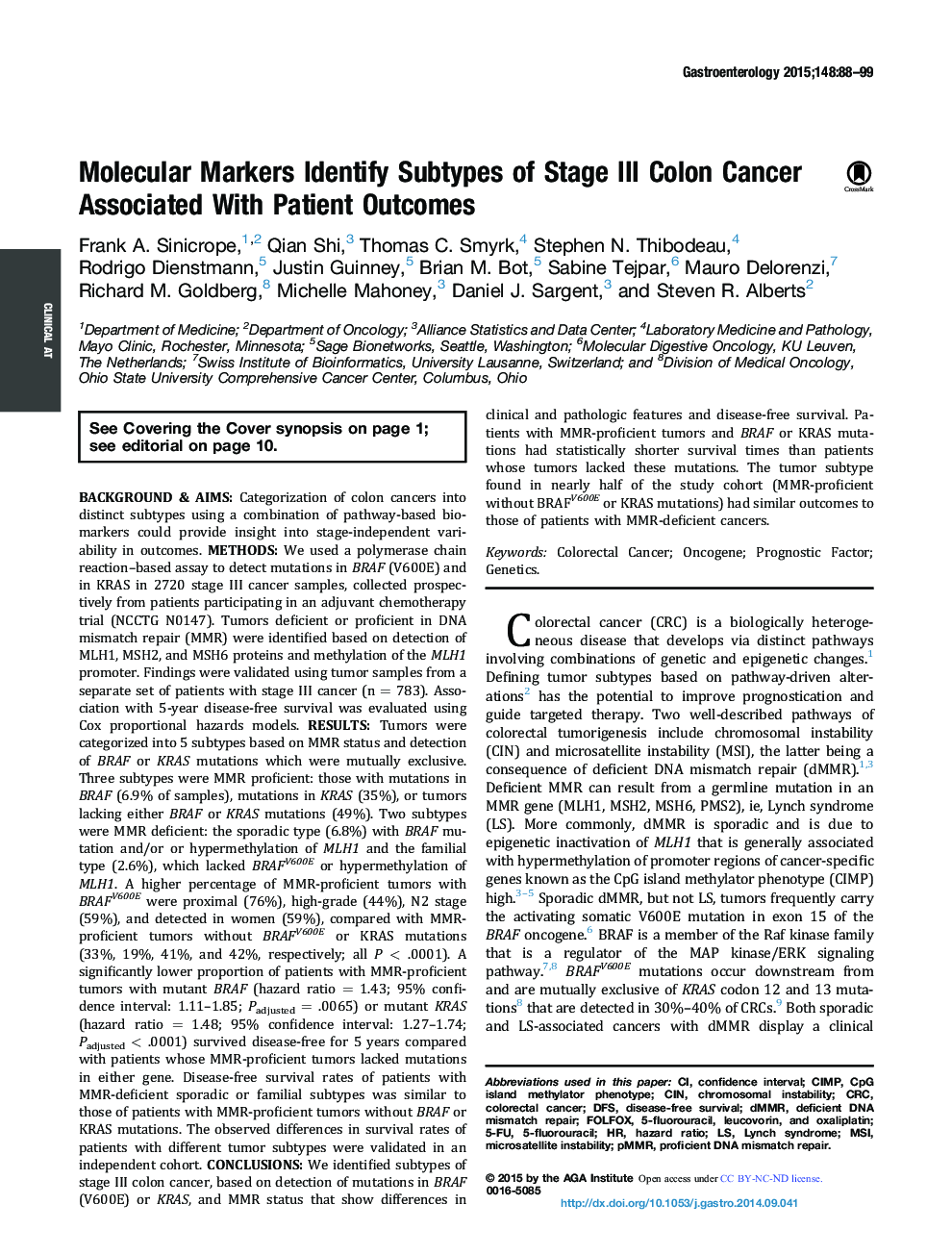| کد مقاله | کد نشریه | سال انتشار | مقاله انگلیسی | نسخه تمام متن |
|---|---|---|---|---|
| 6094141 | 1209802 | 2015 | 12 صفحه PDF | دانلود رایگان |

Background & AimsCategorization of colon cancers into distinct subtypes using a combination of pathway-based biomarkers could provide insight into stage-independent variability in outcomes.MethodsWe used a polymerase chain reaction-based assay to detect mutations in BRAF (V600E) and in KRAS in 2720 stage III cancer samples, collected prospectively from patients participating in an adjuvant chemotherapy trial (NCCTG N0147). Tumors deficient or proficient in DNA mismatch repair (MMR) were identified based on detection of MLH1, MSH2, and MSH6 proteins and methylation of the MLH1 promoter. Findings were validated using tumor samples from a separate set of patients with stage III cancer (n = 783). Association with 5-year disease-free survival was evaluated using Cox proportional hazards models.ResultsTumors were categorized into 5 subtypes based on MMR status and detection of BRAF or KRAS mutations which were mutually exclusive. Three subtypes were MMR proficient: those with mutations in BRAF (6.9% of samples), mutations in KRAS (35%), or tumors lacking either BRAF or KRAS mutations (49%). Two subtypes were MMR deficient: the sporadic type (6.8%) with BRAF mutation and/or or hypermethylation of MLH1 and the familial type (2.6%), which lacked BRAFV600E or hypermethylation of MLH1. A higher percentage of MMR-proficient tumors with BRAFV600E were proximal (76%), high-grade (44%), N2 stage (59%), and detected in women (59%), compared with MMR-proficient tumors without BRAFV600E or KRAS mutations (33%, 19%, 41%, and 42%, respectively; all P < .0001). A significantly lower proportion of patients with MMR-proficient tumors with mutant BRAF (hazard ratio = 1.43; 95% confidence interval: 1.11-1.85; Padjusted = .0065) or mutant KRAS (hazard ratio = 1.48; 95% confidence interval: 1.27-1.74; Padjusted < .0001) survived disease-free for 5 years compared with patients whose MMR-proficient tumors lacked mutations in either gene. Disease-free survival rates of patients with MMR-deficient sporadic or familial subtypes was similar to those of patients with MMR-proficient tumors without BRAF or KRAS mutations. The observed differences in survival rates of patients with different tumor subtypes were validated in an independent cohort.ConclusionsWe identified subtypes of stage III colon cancer, based on detection of mutations in BRAF (V600E) or KRAS, and MMR status that show differences in clinical and pathologic features and disease-free survival. Patients with MMR-proficient tumors and BRAF or KRAS mutations had statistically shorter survival times than patients whose tumors lacked these mutations. The tumor subtype found in nearly half of the study cohort (MMR-proficient without BRAFV600E or KRAS mutations) had similar outcomes to those of patients with MMR-deficient cancers.
Journal: Gastroenterology - Volume 148, Issue 1, January 2015, Pages 88-99